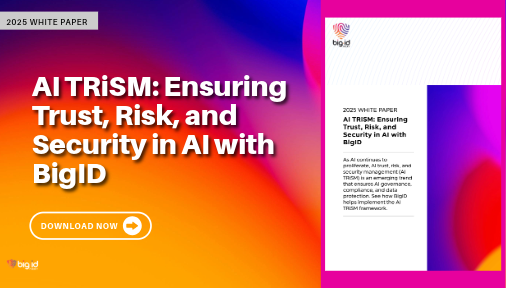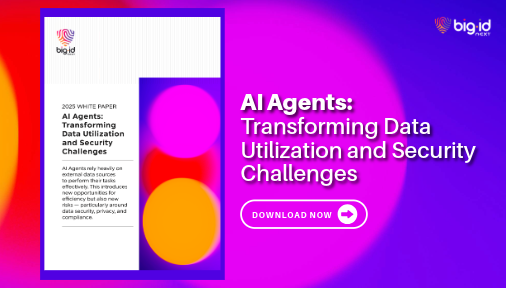Nenhum de nós desconhece a forma como a IA está transformando empresas de todos os portes e segmentos. Da criação de conteúdo à análise preditiva e à personalização para o cliente, ferramentas de IA empresariais Estão se tornando uma necessidade competitiva em 2025.
A IA aumenta a eficiência, mas também cria novos riscos — especialmente quando processa dados sensíveis ou não classificados.
De acordo com Relatório da IBM sobre o custo de uma violação de dados em 2024, o O custo médio de uma violação de segurança causada pelo uso indevido de IA ou aprendizado de máquina foi de $4,76 milhões., sendo a exposição de dados sensíveis de clientes ou funcionários uma das consequências mais dispendiosas.
Então, como você pode desbloquear o poder da IA sem colocar os dados da sua empresa em risco?
Vamos explorar 7 razões principais para Adote a IA de forma responsável. — e como as organizações podem agir com base em seus dados usando plataformas como BigID.
1. As ferramentas de IA são tão inteligentes quanto os dados que você lhes fornece.
A inteligência artificial prospera com dados — mas nem todos os dados são iguais. Alimentar seus modelos com dados imprecisos, desatualizados ou sensíveis pode levar a resultados ruins e expor informações pessoais ou regulamentadas.
Por que isso é importante: Se as ferramentas de IA forem treinadas em dados paralelos (dados armazenados, mas sem boa governança), as organizações podem violar involuntariamente regulamentos de privacidade de dados, como RGPD ou CCPA.
Tome uma atitude: Utilize ferramentas como o BigID para descobrir e classificar automaticamente Todos os seus dados corporativos — em ambientes de nuvem, SaaS e locais — para garantir que a IA utilize apenas conjuntos de dados confiáveis e de boa qualidade.
2. A adoção da IA está superando os protocolos de segurança.
Um recente Pesquisa da Gartner A pesquisa revelou que 731 mil organizações já utilizam ou planejam utilizar IA generativa, mas menos de 241 mil possuem estruturas de segurança formais implementadas para essas ferramentas.
Por que isso é importante: Sem governança, os resultados da IA expõem facilmente dados sensíveis, especialmente em grandes modelos de linguagem (LLMs) que carecem de controles de acesso internos.
Tome uma atitude: Implement governança de acesso a dados e políticas baseadas em objetivos. A BigID ajuda empresas definir quem pode acessar quais dados, para que finalidade, e garante que as ferramentas de IA estejam em conformidade com os padrões de segurança da sua empresa.

3. As violações de dados relacionadas à IA estão em ascensão.
violações de dados relacionadas à IA estão crescendo. Somente em 2023, incidentes de grande repercussão relacionados ao uso indevido de IA incluíram a exposição de documentos internos no ChatGPT e informações de clientes distorcidas em ferramentas públicas.
Por que isso é importante: O custo médio global das violações de segurança envolvendo sistemas de IA aumentou 151 mil milhões de dólares em relação ao ano anterior, sendo os serviços financeiros e os da saúde os mais afetados (IBM 2024).
Tome uma atitude: Identifique dados sensíveis, regulamentados ou de alto risco antes mesmo que sejam usados por ferramentas de IA. A BigID utiliza aprendizado de máquina e descoberta profunda de dados para rotular e categorizar tipos de dados sensíveis — incluindo PI, PHI e IP — para que estejam protegidos antes que a IA tenha acesso a eles.
4. A IA representa um risco de conformidade sem controles de dados robustos.
Da HIPAA à CPRA, os órgãos reguladores aplicam rigorosamente a forma como as empresas utilizam dados pessoais e sensíveis — e a IA não está isenta disso. Sem visibilidade sobre como a IA consome e processa dados, as equipes de compliance estão operando às cegas.
Por que isso é importante: As violações podem levar a multas, processos judiciais e danos à marcaOs órgãos reguladores estão cada vez mais atentos ao uso da IA e aos fluxos de dados subjacentes.
Tome uma atitude: A BigID ajuda as equipes de segurança e privacidade a automatizar a conformidade, criando mapas de dados prontos para auditoria, fluxos de trabalho de aplicação de políticas e monitoramento do uso de dados — todos essenciais para mitigação de riscos de IA.
5. O uso de IA paralela é uma ameaça oculta.
Em 2025, IA sombra O uso de ferramentas de IA não autorizadas por funcionários é um dos riscos que mais crescem em ambientes corporativos. Essas ferramentas geralmente operam fora da visibilidade da TI e podem vazar dados confidenciais por meio de APIs ou armazenamento externos.
Por que isso é importante: Um relatório de IBM Prevê-se que mais de 401 mil e três trilhões de organizações sofrerão incidentes de vazamento de dados por meio de IA paralela até meados de 2025.
Tome uma atitude: BigID permite confiança zeroAssim, você pode sinalizar e corrigir dados que estão sendo acessados ou compartilhados indevidamente — inclusive por meio de aplicativos de IA não aprovados.
6. A higiene de dados impacta a precisão e a ética da IA.
Viés de entrada = viés de saída. Dados desatualizados, duplicados ou tendenciosos levam a IA a replicar e amplificar essas falhas, corroendo a confiança e enfraquecendo as decisões de negócios.
Por que isso é importante: A IA responsável começa com dados limpos, éticos e bem compreendidos. A má higiene dos dados não é apenas ineficiente; é um risco para a reputação.
Tome uma atitude: O BigID te ajuda melhorar a qualidade dos dados por Identificar dados obsoletos, duplicados ou de baixo valor. — para que a IA aprenda com o que importa, e não com o que polui.
7. O futuro da IA é centrado em dados — e começa com a segurança.
À medida que a IA se torna mais integrada a produtos, serviços e à tomada de decisões, as empresas que se destacarem serão aquelas que tratarem os dados como um ativo de segurança, e não apenas como uma fonte de recursos.
Por que isso é importante: Segurança, privacidade e governança deixaram de ser "diferenciais" e se tornaram essenciais para a construção de estratégias de IA responsáveis e escaláveis.
Tome uma atitude: Com o BigID, as empresas podem adotar a IA, garantindo que seus dados estejam seguros, respeitem a privacidade e sejam totalmente governados — possibilitando inovação sem concessões.
Da descoberta de dados à conformidade com a privacidade e à aplicação de políticas, a BigID é a plataforma que ajuda as empresas a inovar com confiança em um futuro impulsionado pela IA. Agende uma demonstração individual hoje mesmo.


